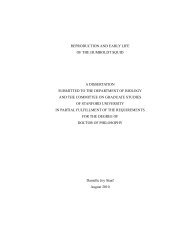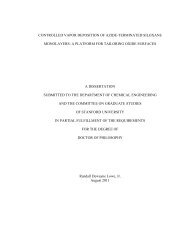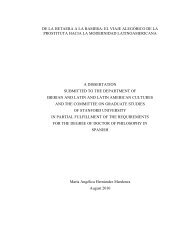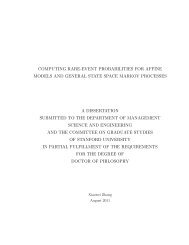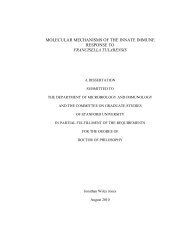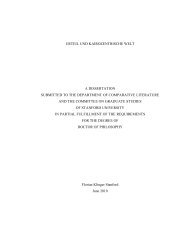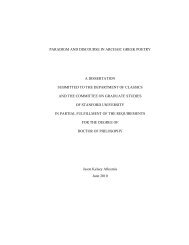essays in public finance and industrial organization a dissertation ...
essays in public finance and industrial organization a dissertation ...
essays in public finance and industrial organization a dissertation ...
Create successful ePaper yourself
Turn your PDF publications into a flip-book with our unique Google optimized e-Paper software.
CHAPTER 2. HEALTH PLAN CHOICE 66<br />
plan design, these <strong>in</strong>termediaries have begun to “risk-adjust” payments to plans (?).<br />
Consumer prices, however, are typically not adjusted for <strong>in</strong>dividual risk. Indeed, <strong>in</strong><br />
the U.S., regulations prohibit employers <strong>and</strong> <strong>public</strong> programs from charg<strong>in</strong>g enrollees<br />
different amounts based on nearly all health-related factors. 1 Moreover, even with<strong>in</strong><br />
<strong>in</strong>stitutional limitations, contributions set by employers or <strong>in</strong> regulated markets may<br />
not be welfare-maximiz<strong>in</strong>g given the complexities of self-selection.<br />
In this paper, we analyze the effect of plan pric<strong>in</strong>g on allocative efficiency. We<br />
beg<strong>in</strong> by mak<strong>in</strong>g a basic theoretical po<strong>in</strong>t regard<strong>in</strong>g plan prices <strong>and</strong> efficient match-<br />
<strong>in</strong>g. Exist<strong>in</strong>g work suggests that, while poorly chosen contribution policies may lead<br />
to <strong>in</strong>efficient outcomes, the problem can be solved by choos<strong>in</strong>g an optimal uniform<br />
contribution (e.g., ????). These analyses, however, make strong assumptions regard-<br />
<strong>in</strong>g the correlation between enrollee risk <strong>and</strong> preferences for coverage. We show that<br />
if these assumptions are violated, no uniform contribution policy leads to efficient<br />
consumer choices.<br />
The ma<strong>in</strong> part of the paper exam<strong>in</strong>es the implications of this observation. We<br />
develop a simple econometric model of health plan dem<strong>and</strong> <strong>and</strong> costs, estimate the<br />
model on a novel dataset of small employers, <strong>and</strong> then use the parameter estimates to<br />
simulate the welfare implications of alternative pric<strong>in</strong>g policies. Based on our simula-<br />
tions, we estimate that, <strong>in</strong> this sett<strong>in</strong>g, observed pric<strong>in</strong>g policies are less efficient than<br />
what could be achieved with risk-rated plan contributions. The shortfall is between<br />
$60 <strong>and</strong> $325 annually per enrollee, or 2-11% of coverage costs. Employers could<br />
realize approximately 1/4 of this surplus by adjust<strong>in</strong>g their non-risk-rated contribu-<br />
tions, but captur<strong>in</strong>g the rema<strong>in</strong>der would require sett<strong>in</strong>g different prices for people <strong>in</strong><br />
the same firm. We also f<strong>in</strong>d that employees select plans based on private <strong>in</strong>formation<br />
about their health status. A hypothetical social planner who <strong>in</strong>corporated this private<br />
<strong>in</strong>formation <strong>in</strong>to prices could <strong>in</strong>crease welfare by an additional $35-$100 annually per<br />
enrollee. Despite these <strong>in</strong>efficiencies, the observed plan offer<strong>in</strong>gs generate substantial<br />
benefits over any s<strong>in</strong>gle-plan offer<strong>in</strong>g.<br />
An underst<strong>and</strong><strong>in</strong>g of the characteristics of the two <strong>in</strong>surers we study is important<br />
for <strong>in</strong>terpret<strong>in</strong>g these results. One has a fairly broad network of providers <strong>and</strong> relies<br />
1 Premiums vary by smok<strong>in</strong>g status <strong>in</strong> some markets.



